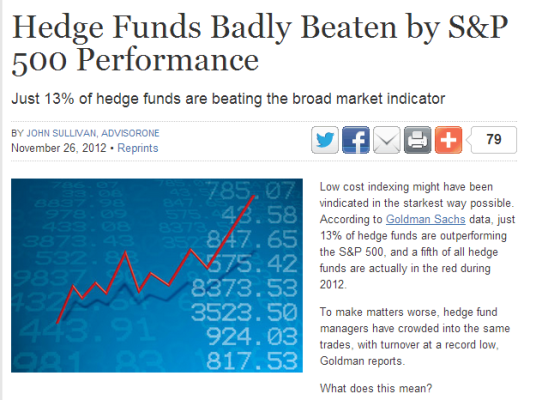Weekend Reading November 30, 2012
Hedge Funds Badly Beaten by S&P 500 Performance
As I write this, the S&P 500 is up 10.88% for the year. While not always the most efficient option, a low cost index fund or ETF will give you exposure to the S&P 500 and only cost you 0.1% or 0.2% each year. A hedge fund on the other hand, will generally run you 2% a year in annual fees and 20% of your profits. If we compare the two to the return above, an investor in an S&P 500 ETF will net around 10.78% of the return above, while a hedge fund investor would net 7.104% after the fees. With the high cost, you’d imagine that hedge funds made up for that with better performance. Well, this year only 13% of hedge funds have outperformed the S&P 500. 20% of hedge funds have lost money for the year.
Click Here To Read The Article
Groupon and Deal Sites See Skepticism Replacing Promise
Could the daily deal craze à la Groupon and Living Social have already seen its heyday? This reporter from Yahoo finance certainly thinks so. The article notes that merchants that have used the service are suffering from “seller fatigue.” Although these deal sites offer an influx of new customers, merchants note that the spending habits of daily deal customers are lower than typical customers. These customers typically spend less than their average customer and are unlikely to become repeat customers. Many customers may have simply bought the deal because it was at a deep discount. These campaigns are costly due to high commissions paid to the deal site and lower revenue, which may cause us to see a decline in the use of daily deal sites.
Click Here To Read The Article
Boehner Sees No Progress In “Fiscal Cliff” Talks
House Speaker John Boehner has stated that there has been little progress during talks about the fiscal cliff. There have yet to be any discussions about spending cuts and now talks over raising the debt ceiling have muddied the waters even further. Secretary of the Treasury Timothy Geithner has even gone so far as so ask Congress to grant the President powers to raise the borrowing limit. However, a growing number of Republicans are prepared to compromise about tax rate increases for high income earners if sufficient spending cuts are instituted.
Click Here To Read The Article
Don’t Be Fooled by the Fed: Stimulus Is a Sign of Dysfunction, Not Opportunity
Several months ago, Ben Bernanke, the Chairman of the Federal Reserve, stated that quantitative easing (QE), i.e. printing money so they can buy bonds and buoy the economy, will continue for as long as necessary for the economy to recover. Pundits contend that the continual injection of money into the markets and the Fed’s backing of the mortgage industry has distorted the market, which could cause an economic correction in the future.
Click Here To Read The Article

